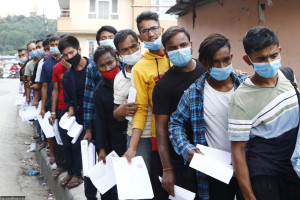Money
With Supreme Court consent, tax authority moves forward with plans to procure excise duty stickers
Excise stickers for imported liquor have run out and the current stock of stickers for domestic liquor and tobacco will only last until mid-June, say officials..jpg&w=900&height=601)
Prithvi Man Shrestha
The Inland Revenue Department will now be moving forward with the procurement of excise duty stickers after the Supreme Court last week ruled in favour of its plan.
The Supreme Court’s February 24 verdict had scrapped a writ petition that sought a halt to the Inland Revenue Department’s plans to move forward with the procurement of excise duty stickers. The petition, filed on behalf of Mirage Printing Solutions, had argued that domestic printers also be allowed to contest the bid.
The court’s verdict has allowed the tax authority to move forward with the procurement process at a time when the department has been reeling under a shortage of stickers. Currently, tax offices have been forced to use stickers meant for domestic liquor for the imported kind. As stickers for imported liquor have run out, importers have been using domestic liquor stickers by stamping them with an ‘imported’ label. Officials say they are fast running out of domestic liquor stickers too, which would effectively mean a halt to popular liquor products.
“We are opening the bids submitted by firms to supply the excise duty stickers on Tuesday,” said Thaneshwor Gautam, deputy director-general of the Inland Revenue Department. “We are starting from where we had stopped the procurement process.”
The selection process will move ahead once the bids are opened, said Gautam.
The department has plans to procure around 8 billion stickers for use over the next two years. It had called for a bid in September and was preparing to open the bids it had received through e-bidding when the writ was filed and an interim stay issued in November last year.
Last week, a bench of justices Deepak Kumar Karki and Tanka Bahadur Moktan scrapped the petition, vacating the interim stay it had ordered earlier.
Gautam said that the department is continuing with the procurement as the entire plan was not scrapped when the court had issued its interim order.
Currently, the department does not know how many bids it has received and who has participated in the bids. The bidders are required to submit both technical and financial proposals in a single bid, according to Gautam.
After opening the bids, the department plans to conclude the evaluation process within a week.
“But the number of days in the evaluation process will depend on how many bids have been received,” said Gautam.
Once the contract is awarded, the department expects to receive the stickers in four to five months.
“We will, however, request the firm that wins the contract to supply the stickers as soon as possible,” said Gautam.
According to the department, based on initial estimates, the current stock of stickers will run out by mid-June.
Based on the cost per sticker maintained four years ago, the estimated cost for 8 billion stickers, which is the amount sought, will be around Rs1.36 billion. Four years ago, a sticker cost around 17 paisa, according to the department.
In interviews with the Post in January, liquor manufacturers and producers had expressed concern about the possibility of counterfeit products flooding the market due to a lack of excise duty stickers.
With the tax authority running out of stickers, producers and importers of liquor and tobacco, one of the major contributors to government revenue, had told the Post that they were concerned over a possible shutdown of their businesses.




 19.67°C Kathmandu
19.67°C Kathmandu















